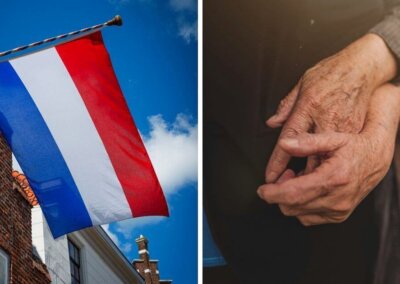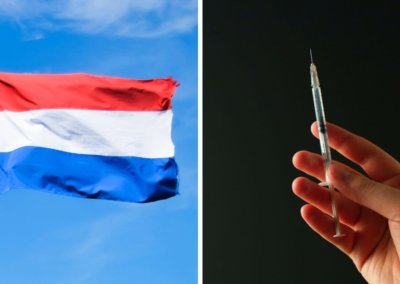A recent poll has indicated that 80% of Dutch voters believe that euthanasia should be available for those who consider their lives complete.
According to the English-language NL Times, a poll revealed that 80% of Dutch voters support euthanasia being available for those who believe their lives are complete, with only 10% of respondents disagreeing. The remaining 10% of voters reported that they had no opinion on the subject.
Providing euthanasia for those with “completed” lives has been a subject within Dutch politics for several years
The poll data comes after the submission of amendments to a controversial bill, first tabled in 2020, which would enable people over 75 to request euthanasia if they feel they have a “completed life”. The MP who initially made the proposal, Pia Dijkstra of the D66 party, claimed that “people of old age who are suffering from life must have the opportunity to die at a self chosen moment”.
The bill faced opposition and caused controversy within the coalition of political parties and, following advice from the Council of State, adjustments were made to the bill and submitted on 7 November 2023 by Anne-Marijke Podt.
Amendments to the bill include increasing the duration and intensity of the engagement of the “end-of-life counselor” who is required to speak with the person requesting euthanasia and check whether the request meets the legal requirements. They will have “undergone special training to guide the elderly person in his or her dying wish and, if necessary, to provide assistance with the execution”.
The new proposed bill requires this figure to have three conversations with the person requesting euthanasia over a six month period, and for a doctor to provide information about any relevant medical factors.
Political parties continue to oppose the Bill
Of the political parties currently represented in the Dutch House of Representatives, ChristenUnie, the Reformed Political Party (SGP), DENK, the Christian Democratic Appeal (CDA), the Socialist Party (SP), the New Social Contract (NSC), the Forum for Democracy (FvD) and JA21 have expressed opposition to the proposal.
Nicki Pouw-Verweij, MP for the Farmer-Citizen Movement (BBB) party, expressed a more mixed view, acknowledging “the deep impoverishment of elderly care” and expressing concerns that the new law “will become a refuge for people who no longer know what to do”.
Meanwhile, Harry Bevers, MP for the People’s Party for Freedom and Democracy (VVD), said “We must avoid anything like social pressure at all costs to get people to make this decision”.
Euthanasia laws in the Netherlands have continued to expand
Euthanasia was effectively decriminalised by a court decision in 1984, and then by Parliament in 2001. In the first year, 1,882 deaths were recorded. This number increased to 6,938 in 2020 accounting for 4.1% of the total number of deaths in the Netherlands in that year.
The Termination of Life on Request and Assisted Suicide Act 2001 permits doctors to administer lethal drugs and to prescribe them for self-administration.
The 2018 Euthanasia Code of Practice made assisted suicide available to elderly people who are not terminally ill but suffering from “normal degenerative conditions that accompany ageing” that can be considered to cause “unbearable suffering with no prospect of improvement”.
The procedure is also available for babies under one year and children aged twelve to fifteen with parental consent. Now, however, the euthanasia regulations are set to be expanded to allow the procedure for children of any age.
There were 8,720 cases of euthanasia (and assisted suicide) in the Netherlands in 2022, accounting for 5.1% of all death in the Netherlands in that year. Euthanasia deaths in 2022 represent a 13.7% increase on 2021.
Spokesperson for Right To Life UK, Catherine Robinson, said “The statistics from the Netherlands are alarming, not only in terms of the number of lives lost to euthanasia, but also the widespread public support for relaxing the laws even further. Once euthanasia becomes permissible within a country, it appears that it does not take long for the culture to embrace and promote it”.











